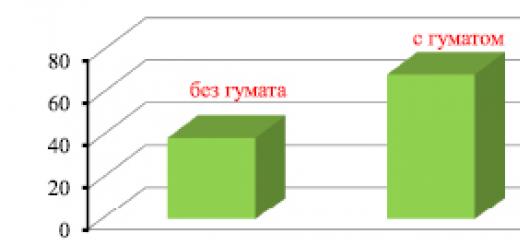How to determine the gender of an abbreviation?
1. The gender of an abbreviation is almost impossible to determine without knowing the decoding of this word. Knowing the exact decoding, we will be able to identify the main (key) word in it, from which we will build.
2 .The main word in the abbreviation (it can be called the semantic core), as a rule, is a noun in the nominative case: C (central) Committee). This word can be at the beginning, in the middle or at the end of the abbreviation. That is, anywhere. If we manage to calculate this word, then its gender will become the gender of the entire abbreviation ( Central Committee- This He).
3. If the abbreviation has firmly and permanently entered the language and began to have signs of a non-abbreviation word (that is, the sounds are pronounced in it no longer as the classical names of individual letters in the alphabet, but as a single whole, then the type of abbreviation will be determined external form words. Let's put it simply: if an abbreviation we are familiar with is similar to a masculine word, then it is this gender that is ultimately assigned to it. Despite the different type of the main word. As a rule, it is masculine.
For example: BAM(he, not she) University(he, not it) and so on.
The basic rule for determining the gender of an abbreviation is its decoding, and by the main word we determine the gender. For example: UN—United Nations, the word organization female, which means UN is a feminine word. Hydroelectric station - station, feminine. Moscow Art Theater - theater, masculine gender.
But it is not always possible to use this rule. There are abbreviations formed from initial sounds words, their components. For example, the words MFA, university, housing department are designed like the noun table and are declined like nouns of the 2nd declension. These nouns are masculine, regardless of the reference word, that is, they are exceptions to the rule.
All abbreviations are made up of the initial letters (sounds) of words; it is rare that 2-3 letters of one word are used in their formation. For example GITIS - State Institute Theater Arts (just for ease of pronunciation). As for the type of abbreviation, by and large there is no clear rule. In many cases, indeed, the gender of an abbreviation is determined by the supporting, main word, noun included in this abbreviation, but often the gender of the abbreviation is a tribute to tradition. That’s how we’re used to it—that’s what we say.
Especially when the reference word is neuter. Like the Ministry of Foreign Affairs or TASS. But still, the CIS is it. NOT used to it yet? Newspeak?
You can also remember BAM, they say, even though it’s a highway.
Also, the gender of foreign abbreviations that have not been translated into Russian is determined only by tradition. And there are discrepancies. For example, NATO - you can see and hear it - an alliance, a bloc and it, as an organization, probably. SEATO is he, UNESCO is she.
By the way, the abbreviation can be plural, without gender.
The USA or the media - them.
Rarely, there are also neuter abbreviations that are consonant with words ending in O - RONO - it. Although the district department is it.
The best way to avoid getting into trouble is to consult a dictionary of abbreviations.
Definition of the type of abbreviations.
The gender of abbreviations is determined by the stem word: GUM - m.r. (shop), UN – f.r. (organization), MAMI - m.r., CIA - m.r. (control). This especially applies to abbreviations consisting of only consonants (PRC, Ministry of Internal Affairs, FBI, LDPR, IMF); they agree accordingly with adjectives and verbs and are not inflected. However, along with the application of old norms, deviations from the definition of gender by the core word are becoming increasingly common. This applies to abbreviations that have a vowel inside. A number of similar abbreviations can be identified, which are equivalent to similar ones in terms of endings common noun, namely: - abbreviations ending in a consonant (regardless of the gender of the stem word), respectively, are declined as a noun. husband. r.: TASS, OMON, MFA, VAK, Organized Crime Control Department, UBEP, BAM, Central Election Commission ( The Ministry of Foreign Affairs protested, the Organized Crime Control Department intensified its actions); - abbreviations ending in - O And – e, are equated to noun. Wed district: RONO, GUNO, ROE, RAO, CJSC, LLP. These case abbreviations do not change ( expanding NATO, with increased ROE). 5. The type of borrowed abbreviations is determined by the Russian translation of their core word: IAEA - sr.r. (agency), NASA - MS. (control).
Declension of nouns,
variants of case forms.
All inflected nouns are used in speech in one case or another. The case system of the Russian language is characterized by a variety of forms and meanings. Within each case, there are variant forms, the use of which is determined by the norms of speech use (due to the reduction in the number of cases - a process that began in the depths of Old Russian language). When using nominative case forms, you should pay attention to the options for using endings - A/- I, - ы/- и in plural forms h. noun husband. R.
| - and I | - ы/ - и |
| directors inspector passports professors paramedic stamps | accountants ages hospitals dispatchers contracts drivers engineers constructors proofreaders sentences printers editors snipers navigators |
| - and I | - ы/ - и |
| addresses (addresses of new residents) years (mine) fur (dress in fur) husbands (and wives) images (of saints) passes (temporary, exchange passes) kind (troops) accounts (bank) teachers (school) bread (winter, spring) | Addresses (congratulations, anniversaries) years (during the war years, nineties) wineskins (wine skins; blacksmith's bellows) men (statesmen, scientists) images (literary) absences (classes, in text) childbirth (ancient) scores (settle) teachers (of humanity, great) breads (bake tin loaves) |
Genitive plural.
Errors in the formation of genus forms are very common. p.m. h.. It should be noted that errors in these forms are associated not only with the ending, but also with stress. Endings compete most actively in speech zero And – ov. The following thematic groups of words with these endings can be distinguished:
- Names of nationalities.
- Names of persons and professions.
- Names of objects, units of measurement.
Genitive case from nouns used mainly in the plural. h.
Use of numeral forms.
Collective and cardinal numbers as synonyms
In some cases, to denote quantity, along with cardinal numerals, collective numerals are also used (two, three, four, five, six, seven, eight, nine). We practically do not use the last two numerals. Collective numerals are used in a limited number of cases, namely: a) with the nouns husband. and general gender, calling persons husband. gender: two friends, three orphans; b) with nouns that have only plural forms: two scissors, three days; c) with nouns children, guys, people, face(meaning “person”): two children, three unfamiliar faces; d) with personal pronouns we you they: There are two of us; e) with substantivized numerals and adjectives denoting persons: two, three patients entered. In indirect cases with inanimate nouns, cardinal numerals are used: more than three days. Collective numerals with nouns denoting male persons sometimes introduce a reduced connotation (undesirable: two generals, three professors). Collective numbers cannot be combined with nouns denoting female persons (you cannot say: three students, four friends). They also cannot be combined with masculine nouns denoting the names of animals (you cannot say: three wolves) If necessary, indicate the number of objects denoted by nouns that have no form singular (scissors, day, etc.), using a compound numeral ending in two three four (twenty three, thirty four etc.), synonymous expressions should be used with the replacement of a noun or the insertion of another word (day - day, twenty-four days) or case (for twenty-two days). When combined with words denoting paired objects, collective numerals denote not the pieces, but the number of pairs: two points, three skis, two boots. Therefore, it is better to use the words “pair” - these are two pairs of skis (boots), three pairs of socks. “Pair” - 2 identical objects that make up a whole. A pair of shoes is 2 shoes (stockings, socks), and a pair of trousers is trousers and another trouser.
| Note! | Speak correctly! |
||
| Masculine Two students Two students Three students Three students Four brothers Four brothers | Feminine Two students Three students Four sisters | childrenchildrenpeopledaysscissorsusyours | |
Declension of the collective numerals both, both.
| Cases | Masculine and neuter | Feminine |
| both students, desks, letters both students, tables, letters both students, tables, letters both students, both tables, letters both students, tables, letters about both students, tables, letters | both students, books both students, books to both students, books both students, both books both students, books about both students, books |
Declension of cardinal numerals.
In compound cardinal numerals, all the words forming them are declined, and nouns denoting countable objects in all cases, except the nominative and accusative, agree with the numeral in the case. For example: a series of manuals with three hundred and sixty-seven drawings. But: The manual contains three hundred sixty-seven drawings(sixty-three drawings).
Declension of numerals 50, 60, 70, 80;
200, 300, 400, 500, 600, 700, 800, 900.
| Cases | 50 – 80 | 200 - 400 | 500 – 900 |
| fifty fifty fifty fifty fifty about fifty | two hundred two hundred two hundred two hundred and two hundred and two hundred | five hundred five hundred five hundred five hundred five hundred about five hundred |
Declension of numerals 40, 90, 100.
| Cases | |||
| forty and forty forty forty | ninety-ninety-ninety-one ninety-ninety-ninety | hundredstastastastao hundred |
- In compound cardinal numbers, each word is declined. At mixed number a noun is governed by a fraction and is used in genitive case singular: 5 3/5 m (five and three-fifths meters, but: five meters), 7 2/3 kg (seven and two-thirds kilograms, but: seven kilograms). The numerals one and a half and one and a half hundred have only two forms: for the nominative and accusative cases and for all others (one and a half, one and a half hundred R, D, T, P).
Declension of compound cardinal numerals.
| Cases | |
| seven thousand four hundred ninety five seven thousand four hundred ninety five seven thousand four hundred ninety five seven thousand four hundred ninety five seven thousand four hundred ninety five seven thousand four hundred ninety five |
Features of date designation.
There are many difficulties in naming dates. When designating a date by day and month by case, the numeral changes; the name of the month is always placed only in the gender. R.: Congratulations on the Eighth of March.The house will be built by the tenth of September. It should be remembered that when designating years in compound numerals such as one thousand one hundred and one... one thousand nine hundred and ninety-nine and year. Only the last word is declined, for example: to one thousand five hundred and eighty-six, from one thousand nine hundred and ninety-two. When denoting periods of time using the construction “from... to...” the numerals themselves and the word year are put in singular. h.: from ninety-one to ninety-six(not years!). In circulation like " In ninety-one - ninety-six" word year put in plural
Difficult words with the first component – numeral.
In such words there are numerals, except ninety And one hundred, are put in the genitive case: five-altyn, forty-altyn, two-thousand-year, eight-hundred-year, But: ninety years old, one hundred and fifty years old.
Control questions.
- How to determine the gender of nouns? What groups of variant forms of nouns in the nominative plural do you know? What groups of variant forms of nouns in the genitive plural do you know? In what cases are collective and cardinal numbers used? What are the features of declension of numerals?
Lecture 6. Verb and functional parts of speech. Difficult cases consumption.
The verb is one of the most important parts of speech in the Russian language. No wonder the word verb V Ancient Rus' denoted human speech in general or a word. IN " Explanatory dictionary…״ V.I. Dahl we read: ״ A verb is human speech, intelligent speech, language״. A.S. Pushkin, addressing the poets, called: ״ Burn the hearts of people with the verb״. In modern Russian the word verb is a part of speech that denotes action. The verb has enormous potential to express the countless actions that accompany a person, to denote natural phenomena. The use of a verb gives dynamism to speech and “accelerates” the movement of the plot. Having such grammatical categories Like tense, mood and person, the verb orients the utterance to the speech situation. An action that does not take place in reality (imperative and subjunctive mood) cannot be correlated with a time period. It is possible under certain conditions, but it may not happen and remain only wishful. For example : If it hadn't been raining, it would have come. Walk down the street. An action that takes place in reality (indicative mood) may coincide with the moment of speech (present tense), or precede the moment of speech (past tense), or follow the moment of speech (future tense). Cm.: He is walking down the street; he was walking down the street; he will walk down the street. The real action, as a rule, has an indication of the performer (1st person, 2nd person, 3rd person singular and plural), i.e. the verb has a category of person, which specifies the speech situation. Thus, tense, mood and person formulate the verb as a predicate, as a unit that occupies a central place in the sentence. Therefore, narrative texts and everyday speech abound in verbal forms. IN modern language by using only verbs certain information can be conveyed. Cm.: It's getting light. It rings, I wake up, I don’t get up, I pull it up, I sleep... He wakes me up, gets angry:״ You'll be late!״ I get up, get dressed, wash, swallow, drink, grab, run... I wait and wait - it doesn’t work. I run, run, run... I'm late. It's ringing. Late... The verb has a rich system of forms. The use of many of them is associated with many difficulties that cause speech errors.
Use of verb forms.
Which letter should be used in the verb: O or A ? This factdetermines...infuses this is a phenomenon. Feature of use verbs imperfect form with suffixes–yva/-iva is the fact that some of them there is an alternation of the vowel in the root (vowel O replaced by a vowel A ). However, in a number of verbs such alternation does not occur. During the development of the Russian literary language in the 11th-20th centuries. alternation O – A more and more verbs were captured. The tendency towards uniformity of forms last years began to manifest itself even more intensely. At the beginning of the twentieth century. in the literary language the forms were considered normative to appropriate, to appropriate, to double, to honor etc., which are now obsolete and replaced by forms with A. In the Russian language there is no single rule for the formation of an imperfective form with a root O or A. Therefore, you should remember: 1) verbs that require the indicated alternation in modern literary language prikO lot - prikA bark razbrO sat – scatteredA dump raskO lot - raskA bark sickO to get sick - to get sickA read freezeO freeze - freezeA live stuckO it - stuckA to live costO nut – zatrA give up propO lot - propA bark obtO read - obtA read processedO thief - processedA poke oblagorO dit – ennobledA live osvO it – masterA to live smallpoxO rit - smallpoxA rip udostO it - honorA to live usvO it - learnA to live doubleO it - doubleA to live mindO lie - mindA hide 2) verbs that preserve the root O provideO to worry - to worryO to live priorO chit – priorO read backO rip - give a kickO rip anesthesiaO pour - numbO pour uzakO thread - uzakO nive conditionedO vit – conditionedO pour centerO sharpen - focusO sharpen fullyO read - authorizedO read to the rearO see - behindO stare convO curl - conventionO pour Some verbs of the second group, by analogy with the verbs of the first group, mistakenly form forms with A : anesthesiaA pour,conditionedA pour in, concentrateA read, authorizedA read. They are colloquial, non-literary.Formation and use of facial shapes.
The verb changes in the present and future tense according to persons ( I'm coming, you're coming, he's coming and so on.). However, what should you do if you need to use a verb in the 1st person singular form? win? A verb act weird? The thing is that some verbs Dont Have separate forms (insufficient verbs). Reasons for missing forms may be different: 1 . Lexical meaning words are not allowed to have forms: a) Verbs that denote processes occurring in living nature and not inherent to humans - to bush, calve, wither, rust, show through, melt and some others - do not have 1st and 2nd person singular and plural forms (in direct meaning). b) Verbs that denote a non-subjective action - it’s dawning, it’s chilly, it’s unwell, it’s freezing, etc. - also do not have the 1st and 2nd person singular and plural forms. c) Verbs whose meaning implies plurality (verbs of joint action), – run away, crawl, crowd, accumulate - do not have singular forms. 2 . The form is cacophonous , awkward to pronounce (the so-called linguistic prejudice “it’s not accepted, they don’t say that”). There are no 1st person forms for verbs – blow, win, wonder, feel, roar, wheel, rustle, outshine, moan and some others. These are verbs that are difficult to pronounce. Historical alternation characteristic of 1st person singular forms (cf.: beand at - beG uh, shuT it - shuh at), leads to cacophony in the named verbs (*will I run? *will I feel?). 3 .Possibility of homonymous coincidence potential forms of 1st person with existing words formed from other verbs. For example: buzz = wake up – wake up, dare = keep – hold. Although in some cases homonymy is allowed: I'm flying from verbs fly And treat; sing = to sing And give something to drink, push = push And grieve, drive = to carry And drive. In the absence of one form or another, native speakers must be able to convey this meaning to others language means using descriptive phrases: I will win, I will blow the whistle, and I don’t think to be weird, I will be able to win, I want to convince, I can find myself, I will try to feel and etc. Against , some verbs have parallel forms ( redundant verbs ) , which may differ in shades of meaning or stylistic coloring.Meaningful difference:
move: moves– “moves, makes movements” (moves furniture, moves hands); drives– “directs, forces, leads” (he is driven by a sense of duty); throw: throws– “throws, moves” (the athlete throws a discus); mosques– “to produce offspring” (fish spawn); splash:splashes- “sprays, sprinkles” (sprinkles water on laundry); splashes- “scatters in drops, scatters drops” (splashes with saliva, a fountain splashes); drip: dripping -“falls in drops, pours drop by drop” (sweat is dripping, the doctor is dripping medicine); caplet -“leaks” (kaplet) from the ceiling. Stylistic difference: erect: erected(lit.) – erected(colloquial); wave: I wave, you wave ( lit.) - I wave, you wave(colloquial); rinse: I rinse, you rinse(lit.) – I rinse, you rinse(colloquial); purr: he purrs, they purr(lit.) – he purrs, they purr(colloquial); cluck: she cackles, they cackle(lit.) – she cackles, they cackle(colloquial). There are also parallel forms of the infinitive: see, climb, measure, torment ( neutral in style) – apparently, measure, torment ( colloquial).Abbreviations are shortened designations, i.e. words made up of the first letters or syllables of a phrase. The definition of gender depends on the type of abbreviation.
If the abbreviation is indeclinable (i.e. does not have case endings), then it has the same genus as leading word decrypted name: UN→United Nations→organization– f..r.→ UN– f.r. (UN stated); IMF→International Monetary Fund→fund– m.r.→ IMF– m.r. (The IMF provided loans).
If the abbreviation is inflected (i.e. changes by case, like a regular noun: university– at the university– university etc.), then the gender is determined according to the grammatical principle: university– a word of masculine gender, as it is declined like masculine nouns (prestigious university, the university has announced admission, study at the university); NEP– m.r. (NEP was a transition period), social security– m.r. (city social security), Ministry of Foreign Affairs– m.r. (to the Russian Ministry of Foreign Affairs, in the Russian Ministry of Foreign Affairs).
3. The gender of foreign abbreviations is determined by the gender of the leading word translated into Russian: UNESCO→United Nations Educational, Scientific and Cultural Organization→organization– f.r.→ UNESCO– f.r. (UNESCO organized); NATO→North Atlantic Treaty Organization, North Atlantic Alliance→f.r. And m.r. (NATO announced And NATO announced).
3. Compound words How to correctly: a beautiful sofa-bed or a beautiful sofa-bed, an old raincoat or an old raincoat
These are words consisting of two words and written with a hyphen. Their gender is determined by the gender of the word, which is semantically leading.
In most cases, the leading component comes first: studio theater– m.r. (educational theater-studio); chair-bed– s.r. (old chair-bed); club-cafe– m.r. (club-cafe is closed); reference book– f.r. (large reference book), showcase stand– f.r. (colorful display stand).
Less often, the second component is the leading one. For example, the word raincoat- and. R. (protective raincoat); words with components block-, vacuum-, diesel-, press-, stop- (block diagram– f.r. (block diagram installed)); words with evaluative components grief, miracle (woe-driver– m.r. (the unfortunate driver damaged the car)).
4. Nouns with increasing and diminutive suffixes Which is correct: a child’s mind or a child’s mind, such a good fellow or such a good fellow
Most words with evaluative augmentative and diminutive suffixes are of the same gender as the words from which they are derived: domina, domina, domishko- all masculine (there was a house, a nondescript house), because house– a masculine word; little voice, little voice, little voice- all masculine (loud voice, little voice rang), because voice- a masculine word. It should be noted that in the accusative case the definition of nouns with a suffix -in- has a feminine form: I see a huge domina, I hear a thunderous voice.
Exceptions to this rule are:
A) feminine words(despite the fact that they come from masculine words): trunk(from trunk; straight stem); snowdrift(from snowdrift; high snowdrift);
b) words related to general gender(i.e. both masculine and feminine): well done(from Well done; he's so cool(m.r.), she's so young(f.r.)); cattle(from livestock; real brute, real brute); freak(from freak; so ugly, so ugly).
How to determine the gender of nouns?
Correct definition gender of nouns allows you to avoid errors in their agreement with verbs in the past tense form ( the coffee has cooled down or cooled down) and adjectives ( the coffee is delicious or delicious).
Since most often the grammatical gender of nouns does not directly correlate with the lexical meaning of the word, whether a noun is masculine, neuter or feminine has to be memorized (memorized). This is most difficult for those who study Russian as a foreign language.
Native speakers of Russian have difficulty defining grammatical gender occur with the following types of words:
- the largest group is indeclinable borrowed nouns: coffee, cocoa, Bordeaux, whiskey, brandy, boa, brie, argot, euro, Esperanto;
- foreign language geographical names: Monaco, Limpopo, Tokyo, Helsinki, Tartu, Capri, Chile, Yellow River;
- abbreviations: UN, UNESCO, NATO, CIS, PRO, VAK, TASS, GLONASS.
- some nouns ending in -Л in the form im. n. (doubts arise whether these words should be attributed to the second or third declension): tulle, callus, polish, roofing felt, valve.
- nouns, plural form including which usually denotes a pair of shoes: shoes, boots, slippers, sandals and so on.
- compound nouns.
Let's look at each of these types of words in more detail.
1. Gender of indeclinable borrowed nouns
Most indeclinable nouns that look similar to indeclinable neuter nouns (such as sea And window), belong to the neuter gender: aromatic cocoa, aged Bordeaux, heady Chardonnay, hot cappuccino, locomotive depot, new coat, wicker flowerpot.
Word coffee strict literary norm prescribes to use as a masculine noun: the strong coffee has already cooled down. However, in a relaxed oral speech Neuter gender agreement is acceptable: the coffee is cold.
It should be noted that there are many exceptions to this rule related to the influence of various analogies (such as the presence of a commonly used inflected Russian synonym; the possibility of substituting an inflected word denoting a generic concept, etc.). Thus, the words are masculine Euro(since most names of monetary units are masculine, cf.: dollar, ruble, pound, franc, tugrik...), bri, suluguni(the influence of the generic concept cheese), sirocco(the influence of the word wind), penalty(influence of the Russian synonym penalty kick). The feminine gender includes words Avenue(cf. Street), kohlrabi(cabbage), salami(sausage), etc.
Some words can be used in two genders. Such words include, for example, nouns that look similar to inflected nouns in the plural form. h.: aged whiskey And aged whiskey; Armenian brandy And Armenian brandy. Therefore, in all doubtful cases, to determine the gender of a word, you should consult Russian dictionaries.
2. Gender of foreign-language geographical names
Most often, the gender of such names is determined by the generic word: distant (principality) Monaco, wide (river) Limpopo, densely populated (city) Tokyo. If you can use two different generic words, then agreement options are possible: independent (state) Haiti, independent (country) Haiti, distant (island) Haiti, beautiful (city) Brescia And beautiful (province) Brescia.
In some cases, the gender of a noun is established by tradition, so a dictionary check is required.
3. Gender of compound words (abbreviations)
The gender of abbreviations is usually determined by the reference word in the decoding of the abbreviation or by the generic word: NATO (alliance) decided, Moscow State University (university) accepted new students, the CIS (commonwealth) took the initiative, UNESCO (organization) declared 2009 the Year of Gogol.
More information about the correct use of abbreviations in the text can be found in the article How to use abbreviations correctly
4. Gender of nouns ending in -Л
The second declension and the masculine gender include, in particular, the following words: aerosol, polish, lampoon, vaudeville, quantile, quartile, endgame, tulle, roofing felt, flat.
The third declension and feminine gender include words such as mezzanine, callus, rosin, vacuole, triplet.
Gender affiliation and belonging to the second or third declension are checked in such cases in dictionary order. For example, you can use dictionaries in the “Word Check” section on our portal.
5. Names of shoes and paired items
Things to remember:
And also: gaiters - one gaiter, leggings - one gaiter, sideburns - one sideburn, leggings - one legging.
BUT: knee socks - one golf, rails - one rail, adjustments - one adjustment.
In addition, there is a bigender noun high boots. If in plural h. the emphasis falls on the end of the word (high boots, -o c), then the singular form is one ounce If in plural h. the emphasis falls on the stem ( u nty), form named after p.un. h. - at nta.
6. Compound nouns
Abbreviation as a way of forming new words by shortening the original complex phrase is relatively new for the Russian language. The beginning of mass abbreviation dates back to the 20s of the twentieth century, when many new institutions with long names appeared in the young Soviet Republic. At the same time, there was a need to denote them in abbreviations. For example: Moscow Art Theater, RSFSR, NEP; ROSTA windows(Russian Telegraph Agency.
Abbreviation as a method of word formation does not disappear; the number of abbreviations is growing, despite the protests of writers, journalists, and other representatives of the Russian-speaking intelligentsia, who from the very beginning criticized complex abbreviated words for their cumbersome, often dissonant nature. This method remains one of the most powerful and persistent linguistic processes of our time, as it reflects the dynamic nature of modern history. Abbreviation is not actually Russian, but a universal way of word formation, characteristic of many national languages.
At the first stage of their formation, abbreviations demonstrated the meaning of the gender of the core word of the original phrase. So, Moscow Art Theater is consistent in the masculine gender in accordance with the gender of the reference word (Moscow Art Academic theater them. M. Gorky); RSFSR– in women's (Russian Soviet Federative Socialist Republic); housing department– neuter (housing and maintenance control).
However, over almost a century of active functioning, abbreviations have been divided into two groups according to the method of formation, which acquire the meaning of gender in different ways.
Letter abbreviations, formed using the initial letters of the original name, retain the meaning of the gender of the stem word. For example: MSU, KPP, USSR, ICTs - male; ORT, CIS, Ministry of Emergency Situations, Design Bureau - average; LDPR, GTS, FSB – female. From the very beginning of its formation, a letter abbreviation acquires the status neologism- a new word that does not fit into the grammatical system of a given national language. Indeed, neoplasms like NTV, CSKA, EVM, GRU, UMPO does not correspond to the phonetic appearance of the Russian word, since in their structure there is no harmonious alternation of vowels and consonants. These words are pronounced by letter: Ministry of Emergency Situations[um-che-es], checkpoint[ka-pe-pe]. Therefore, alphabetic abbreviations fall into the category of unchangeable words, and to determine their gender it is necessary to “reveal” their outer shell - decipher it, restoring the original phrase, find the core word, and only after that carry out coordination with dependent words in accordance with the gender of the core word. For example: take me to the first checkpoint(checkpoint); GTS(city telephone exchange) has not yet concluded an agreement with the new enterprise; UMPO(Ufa Engine Production Association) completely restored the previous volume of production orders.
Sound abbreviations are formed by merging the initial sounds of the original name: university, Ministry of Foreign Affairs, registry office, hydroelectric power station, housing office, ROE, GUNO, Labor Code, NOTES, RIO, traffic police, media, FIFA, TsGALI. Sound abbreviations show significant variations in gender.
If the appearance of a new word is a harmonious alternation of vowels and consonants, such as SGS, SGSG, SGSS, then the abbreviation quickly adapts in the linguistic environment, speakers begin to change this word in number and case, and also form new derivatives from it. This is what happened with abbreviations. University, Civil Registry Office, Ministry of Foreign Affairs, Central Election Commission. Due to the frequency of use, some sound abbreviations were written using lowercase letters, since speakers almost completely lost their connection appearance with the content of the original name. Compare: study in technical university, best universities countries, university textbooks; go to the new registry office, documents from the registry office; The Russian Foreign Ministry stated...; representatives of the Central Election Commission.
Another reason for fluctuations in grammatical gender was the very difficulty of etymological deciphering the original phrase, which served as the basis for the creation of one or another abbreviation. K. S. Gorbachevich, author of the textbook “Norms of the Modern Russian Literary Language,” interviewed dozens of people (of course, not medical specialists) regarding the grammatical gender of the well-known abbreviation ROE. Compare: take blood for ROE, he has an elevated ROE. Almost everyone classified this compound word as neuter (on a formal basis). Few people remembered (and some did not know) about the core word of the abbreviation: ROE - reaction erythrocyte sedimentation. Here K. S. Gorbachevich notes: “Apparently, the rule itself, which prescribes an abbreviation to have the grammatical gender of its core word, needs to be revised.”
Thus, the type of sound abbreviations, similar in phonetic structure to ordinary Russian words, is determined formally - by the last sound of the stem. Nouns Ministry of Foreign Affairs, Housing Office, University, Registry Office, BAM, similar to monosyllabic masculine words such as house, poppy, ace, century, cake, function as masculine names: our housing office(housing maintenance office), prestigious university(higher education institution), city registry office(civil registration), unfinished BAM(Baikal-Amur Mainline). Nouns ROE, ESR, RONO, RIO were automatically related to neuter names, such as hay, window, sky: increased ESR(erythrocyte sedimentation rate) , RONO(district department public education) sent documents, RIO(editorial and publishing department) provided comments. Recently, sound abbreviations have appeared that have the form of a feminine noun: TEA(Freight forwarding agency), ASTA(astatic ammeter). They are used in the text as feminine names: TEA was created; ACTA was used in the study.
The contradiction that arises between the etymological meaning of the gender (the meaning of the gender of the core word) and the new formal motivation of the gender leads to such a phenomenon as fluctuations in the use of one or another gender. For example: Ministry of Foreign Affairs(Ministry of Foreign Affairs) stated And stated; ITAR-TASS(Information Telegraph Agency of Russia - Telegraph Agency of Sovereign Countries) reported And reported. Observations show that the inflected version predominates in colloquial speech. It gradually replaces the indeclinable version when using sound abbreviations. However, in strict official documents the meaning of the gender of the core word and the indeclinable variant are retained. Compare: Foreign Ministry statement(in official document) – documents from the Ministry of Foreign Affairs(in oral speech).
If a sound abbreviation has no analogies in the language, that is, does not correspond in its sound structure to ordinary nouns, such neologisms retain the meaning of the gender of the core word and function as unchangeable names. For example: modernized automated control system(automated control system), ultrasound scheduled(ultrasonography), UN(United Nations) organized a press conference, UGATU(Ufa State Aviation Technical University) sent the documents.
For borrowed sound abbreviations, the gender is most often determined by its external form: wonderful FIAT(tracing paper from Italian Fabrika italiana di automobile di Torino), DEFA has released a new film(from German Deutsche Filmatellier – studio). The exception is NATO, w(North Atlantic Treaty Organization from EnglishNorth Atlantic Treaty Organization) And UNESCO(United Nations Educational, Scientific and Cultural Organization from EnglishUnited Nations Educational Scientific and Cultural Organization).
Thus, the holistic perception of a sound abbreviation as independent word, easily subsumed by a morphological feature (the final sound of the stem) under one or another categorial-gender category of nouns, as well as the difficulty of establishing a core word (sometimes completely forgetting it) lead to a significant shift in abbreviations in relation to gender.
One of the pressing problems of speech culture is the creation of dissonant abbreviations and compound words. In Soviet times, such abbreviations as scrub(school worker), Minbumdrevprom(Ministry of Paper and Wood Processing Industry), UzODKS(Uzbek Society of Friendship and Cultural Relations with Foreign Countries). Cacophonous neologisms still appear today (State Traffic Safety Inspectorate, RUBOP, Paper Products). To eliminate this problem, it is necessary to remember that an abbreviation is the result of the word-creating activity of the speakers themselves. Dissonant abbreviated names appear as a result of the indifferent attitude of their creators to language and speech, and in general - as a result of the aesthetic illegibility of a native speaker.










